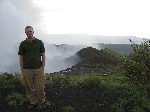Posted on Monday, August 13, 2007
Westminster College professors Dr. Kristin Park, associate professor of sociology, and Dr. Joel Postema, assistant professor of Spanish, attended an international faculty development seminar with the Council on International Educational Exchange (CIEE) in Nicaragua.
Funding to attend was supplied through Westminster's annual CIEE Award and a gift from the Class of 1981.
The seminar theme, "Revolution and the Rise of Neoliberalism," included the topics "The Sandanista Revolution and its Legacy;" "The Contra War and its Impact on Nicaraguan Society," including a roundtable with former combatants; "Religion in Nicaragua;" and "Poverty and Development." Session presenters were academics in the social sciences and current and past policymakers in the Nicaraguan government and international organizations.
Postema particularly appreciated "International Development in the Nicaraguan Context," the presentation by Paul Oquist. "Although he did talk about international development, most of the time was dedicated to explaining why, as a young American, he moved to Nicaragua during a time of conflict and some of the things he experienced," Postema said.
Park found the most moving session to be the former resistance ("contra") fighters and former Sandanista soldiers speaking about their efforts at reconciliation since the1980s war.
Opportunities for travel within the country included visits to historical and political monuments, performances of traditional music and dance, an arts and crafts market, and a boat trip around the islands near Granada. Postema traveled to Villa el Carmen with Kristin Allen, a 2007 Westminster graduate, who is a summer intern in the schools.
One of Park's applications of the seminar is her creation of an assignment for her social theory class. "Students will take on various roles in Nicaraguan society, including a Sandinista party member, a Miskito Indian and contra fighter, a high ranking Catholic church official, a peasant, a college student, and the social theorist Karl Marx. They research the role in terms of that person's likely response, based on his or her social position, values and interests, to the 1979 Sandinista revolution. They will then role play what they have learned. They are also asked to apply their knowledge of the Marxist theory to assess the extent to which to Sandinista revolution matched Marx's vision and predictions," she explained.
Postema said, "The most tangible application of the seminar will be in a course on Nicaraguan culture and history I will be teaching this fall. The perspectives I have gained about post-Sandanista government and politics will help me better present this chaotic period in a clear way to that particular class. I have brought back materials such as menus and laundry checklists that I plan to use in language courses. Perhaps most importantly, the ability to travel and use Spanish every day is immeasurably beneficial."
Park has been with Westminster since 1993. She earned her undergraduate degree at Colgate University and her master's and Ph.D. at the University of North Carolina at Chapel Hill.
Postema has been with Westminster since 2005 and is an endowed professor of humanities. He earned his undergraduate degree from Calvin College, his master's from Western Michigan University, and his Ph.D. from Washington University.
Contact Park at (724) 946-7251 (e-mail kpark@westminster.edu) or Postema at (724) 946-7263 (e-mail postemjt@westminster.edu) for additional information.

